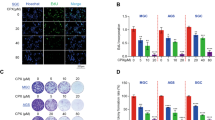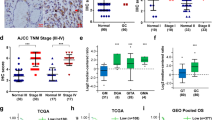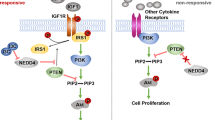Abstract
Tumor necrosis factor (TNF)-α-induced protein 8-like 2 (TNFAIP8L2/TIPE2) as a novel anti-inflammatory factor plays an important role in maintaining immune homeostasis. Recently, TIPE2 has been shown to inhibit hepatocarcinoma growth and metastasis through targeting Ras and Rac1. However, its effects in human cancers are poorly understood. In the present study, we analyzed TIPE2 mRNA expression in a panel of human gastric cancer cells (AGS, HGC-27 and SGC-7901) and then examined the cell-autonomous effects of adenovirus-mediated human TIPE2 gene transfer (AdVTIPE2) on AGS and HGC-27 human gastric cancer cells. We found that compared with the GES-1 normal human gastric mucous epithelial cells, human TIPE2 was lost in the AGS, HGC-27 and SGC-7901 gastric cancer cells. Adenovirus-mediated human TIPE2 overexpression significantly inhibited AGS and HGC-27 gastric cancer cell growth and induced AGS and HGC-27 tumor cell apoptosis in vitro. Furthermore, AdVTIPE2 treatment obviously suppressed the growth of AGS gastric cancer subcutaneously xenografted tumors implanted in athymic BALB/c nude mice in vivo. Mechanistically, AdVTIPE2 exhibited marked effects on the upregulation of Bax, cleaved Caspase-9, cleaved Caspase-3, cleaved poly ADP ribose polymerase as well as the downregulation of B-cell lymphoma (Bcl)-XL, phosphorylated-protein kinase B (p-PKB/AKT), phosphorylated-extracellular signal-regulated kinase 1/2 (p-ERK1/2) in AGS gastric cancer cells in vitro and in vivo. Collectively, AdVTIPE2 suppressed gastric cancer growth very possibly by the activation of intrinsic apoptotic pathway and the attenuation of AKT and ERK1/2 signaling. Thus, our data indicated that TIPE2 may be a novel potential therapeutic target for human gastric cancer.
This is a preview of subscription content, access via your institution
Access options
Subscribe to this journal
Receive 12 print issues and online access
$259.00 per year
only $21.58 per issue
Buy this article
- Purchase on Springer Link
- Instant access to full article PDF
Prices may be subject to local taxes which are calculated during checkout





Similar content being viewed by others
References
Sun H, Gong S, Carmody RJ, Hilliard A, Li L, Sun J et al. TIPE2, a negative regulator of innate and adaptive immunity that maintains immune homeostasis. Cell 2008; 133: 415–426.
Lou Y, Liu S . The TIPE (TNFAIP8) family in inflammation, immunity, and cancer. Mol Immunol 2011; 49: 4–7.
Freundt EC, Bidere N, Lenardo MJ . A different TIPE of immune homeostasis. Cell 2008; 133: 401–402.
Wang Z, Fayngerts S, Wang P, Sun H, Johnson DS, Ruan Q et al. TIPE2 protein serves as a negative regulator of phagocytosis and oxidative burst during infection. Proc Natl Acad Sci USA 2012; 109: 15413–15418.
Sun H, Zhuang G, Chai L, Wang Z, Johnson D, Ma Y et al. TIPE2 controls innate immunity to RNA by targeting the phosphatidylinositol 3-kinase-Rac pathway. J Immunol 2012; 189: 2768–2773.
Luan YY, Yao YM, Zhang L, Dong N, Zhang QH, Yu Y et al. Expression of tumor necrosis factor-alpha induced protein 8 like-2 contributes to the immunosuppressive property of CD4(+)CD25(+) regulatory T cells in mice. Mol Immunol 2011; 49: 219–226.
Lou Y, Zhang G, Geng M, Zhang W, Cui J, Liu S . TIPE2 negatively regulates inflammation by switching arginine metabolism from nitric oxide synthase to arginase. PLoS One 2014; 9: e96508.
Li D, Song L, Fan Y, Li X, Li Y, Chen J et al. Down-regulation of TIPE2 mRNA expression in peripheral blood mononuclear cells from patients with systemic lupus erythematosus. Clin Immunol 2009; 133: 422–427.
Xi W, Hu Y, Liu Y, Zhang J, Wang L, Lou Y et al. Roles of TIPE2 in hepatitis B virus-induced hepatic inflammation in humans and mice. Mol Immunol 2011; 48: 1203–1208.
Zhang W, Zhang J, Zhao L, Shao J, Cui J, Guo C et al. TIPE2 protein negatively regulates HBV-specific CD8(+) T lymphocyte functions in humans. Mol Immunol 2014; 64: 204–209.
Ma Y, Liu X, Wei Z, Wang X, Wang Z, Zhong W et al. The expression and significance of TIPE2 in peripheral blood mononuclear cells from asthmatic children. Scand J Immunol 2013; 78: 523–528.
Lou Y, Liu S, Zhang C, Zhang G, Li J, Ni M et al. Enhanced atherosclerosis in TIPE2-deficient mice is associated with increased macrophage responses to oxidized low-density lipoprotein. J Immunol 2013; 191: 4849–4857.
Lou Y, Sun H, Morrissey S, Porturas T, Liu S, Hua X et al. Critical roles of TIPE2 protein in murine experimental colitis. J Immunol 2014; 193: 1064–1070.
Gus-Brautbar Y, Johnson D, Zhang L, Sun H, Wang P, Zhang S et al. The anti-inflammatory TIPE2 is an inhibitor of the oncogenic Ras. Mol Cell 2012; 45: 610–618.
Cao X, Zhang L, Shi Y, Sun Y, Dai S, Guo C et al. Human tumor necrosis factor (TNF)-alpha-induced protein 8-like 2 suppresses hepatocellular carcinoma metastasis through inhibiting Rac1. Mol Cancer 2013; 12: 149.
Zhao Q, Zhao M, Dong T, Zhou C, Peng Y, Zhou X et al. Tumor necrosis factor-alpha-induced protein-8 like-2 (TIPE2) upregulates p27 to decrease gastic cancer cell proliferation. J Cell Biochem 2015; 116: 1121–1129.
Li Y, Li X, Liu G, Sun R, Wang L, Wang J et al. Downregulated TIPE2 is associated with poor prognosis and promotes cell proliferation in non-small cell lung cancer. Biochem Biophys Res Commun 2015; 457: 43–49.
Liu QQ, Zhang FF, Wang F, Qiu JH, Luo CH, Zhu GY et al. TIPE2 inhibits lung cancer growth attributing to promotion of apoptosis by regulating some apoptotic molecules expression. PLoS One 2015; 10: e0126176.
Li XM, Su JR, Yan SP, Cheng ZL, Yang TT, Zhu Q . A novel inflammatory regulator TIPE2 inhibits TLR4-mediated development of colon cancer via caspase-8. Cancer Biomark 2014; 14: 233–240.
Zhang Z, Qi H, Hou S, Jin X . TIPE2 mRNA overexpression correlates with TNM staging in renal cell carcinoma tissues. Oncol Lett 2013; 6: 571–575.
Jemal A, Bray F, Center MM, Ferlay J, Ward E, Forman D . Global cancer statistics. CA Cancer J Clin 2011; 61: 69–90.
Ushijima T, Sasako M . Focus on gastric cancer. Cancer Cell 2004; 5: 121–125.
He TC, Zhou S, da Costa LT, Yu J, Kinzler KW, Vogelstein B . A simplified system for generating recombinant adenoviruses. Proc Natl Acad Sci USA 1998; 95: 2509–2514.
Liu Y, Ye T, Sun D, Maynard J, Deisseroth A . Conditionally replication-competent adenoviral vectors with enhanced infectivity for use in gene therapy of melanoma. Hum Gene Ther 2004; 15: 637–647.
Xie Y, Sheng W, Miao J, Xiang J, Yang J . Enhanced antitumor activity by combining an adenovirus harboring ING4 with cisplatin for hepatocarcinoma cells. Cancer Gene Ther 2011; 18: 176–188.
Zhang G, Hao C, Lou Y, Xi W, Wang X, Wang Y et al. Tissue-specific expression of TIPE2 provides insights into its function. Mol Immunol 2010; 47: 2435–2442.
Coussens LM, Zitvogel L, Palucka AK . Neutralizing tumor-promoting chronic inflammation: a magic bullet? Science 2013; 339: 286–291.
Zhang L, Shi Y, Wang Y, Zhu F, Wang Q, Ma C et al. The unique expression profile of human TIPE2 suggests new functions beyond its role in immune regulation. Mol Immunol 2011; 48: 1209–1215.
Chappell WH, Steelman LS, Long JM, Kempf RC, Abrams SL, Franklin RA et al. Ras/Raf/MEK/ERK and PI3K/PTEN/Akt/mTOR inhibitors: rationale and importance to inhibiting these pathways in human health. Oncotarget 2011; 2: 135–164.
Saini KS, Loi S, de Azambuja E, Metzger-Filho O, Saini ML, Ignatiadis M et al. Targeting the PI3K/AKT/mTOR and Raf/MEK/ERK pathways in the treatment of breast cancer. Cancer Treat Rev 2013; 39: 935–946.
Porta C, Paglino C, Mosca A . Targeting PI3K/Akt/mTOR signaling in cancer. Front Oncol 2014; 4: 64.
Zhang G, Zhang W, Lou Y, Xi W, Cui J, Geng M et al. TIPE2 deficiency accelerates neointima formation by downregulating smooth muscle cell differentiation. Cell Cycle 2013; 12: 501–510.
Zhang YH, Yan HQ, Wang F, Wang YY, Jiang YN, Wang YN et al. TIPE2 inhibits TNF-alpha-induced hepatocellular carcinoma cell metastasis via Erk1/2 downregulation and NF-kappaB activation. Int J Oncol 2015; 46: 254–264.
Danial NN, Korsmeyer SJ . Cell death: critical control points. Cell 2004; 116: 205–219.
Acknowledgements
This research work was supported by grants from the National Natural Science Foundation of China (NNSFC) (Nos. 81372443, 81001016, 81272542 and 81572992), the Science and Technology Department of Jiangsu Province (Nos. BL2014039 and BY2015039), the Science and Technology Development Bureau of Xiangcheng District of Suzhou City (No. XJ201534), the Pushin HK Jiangsu Medical Technology (No. P112200315) and the Wu Jieping Medical Foundation (No. P112200914).
Author information
Authors and Affiliations
Corresponding authors
Ethics declarations
Competing interests
The authors declare no conflict of interest.
Rights and permissions
About this article
Cite this article
Zhu, Y., Tao, M., Wu, J. et al. Adenovirus-directed expression of TIPE2 suppresses gastric cancer growth via induction of apoptosis and inhibition of AKT and ERK1/2 signaling. Cancer Gene Ther 23, 98–106 (2016). https://doi.org/10.1038/cgt.2016.6
Received:
Revised:
Accepted:
Published:
Issue Date:
DOI: https://doi.org/10.1038/cgt.2016.6
This article is cited by
-
TIPE2 suppresses progression and tumorigenesis of esophageal carcinoma via inhibition of the Wnt/β-catenin pathway
Journal of Translational Medicine (2018)
-
TIPE2 acts as a biomarker for GIST risk category and suppresses the viability and invasiveness of GIST cells
Cell & Bioscience (2018)
-
Regulation of inflammation and tumorigenesis by the TIPE family of phospholipid transfer proteins
Cellular & Molecular Immunology (2017)
-
Adenovirus-mediated TIPE2 overexpression inhibits gastric cancer metastasis via reversal of epithelial–mesenchymal transition
Cancer Gene Therapy (2017)



